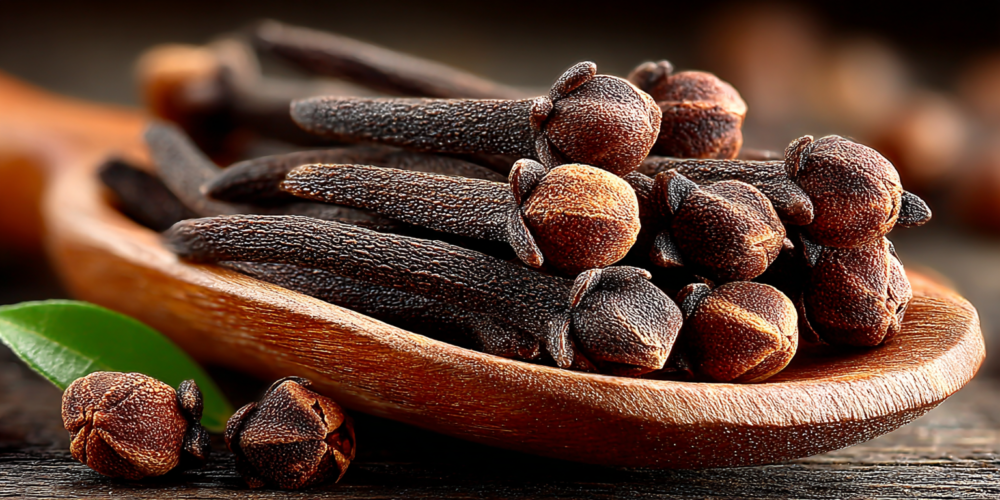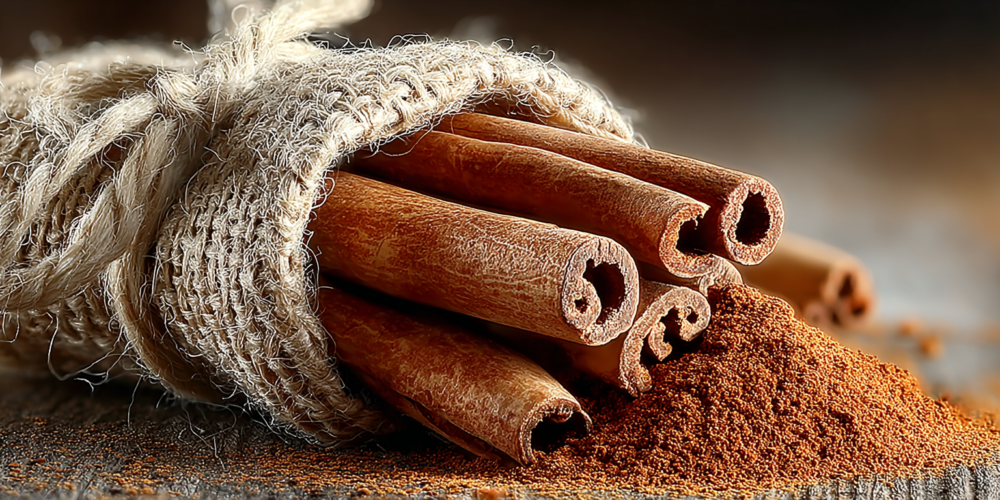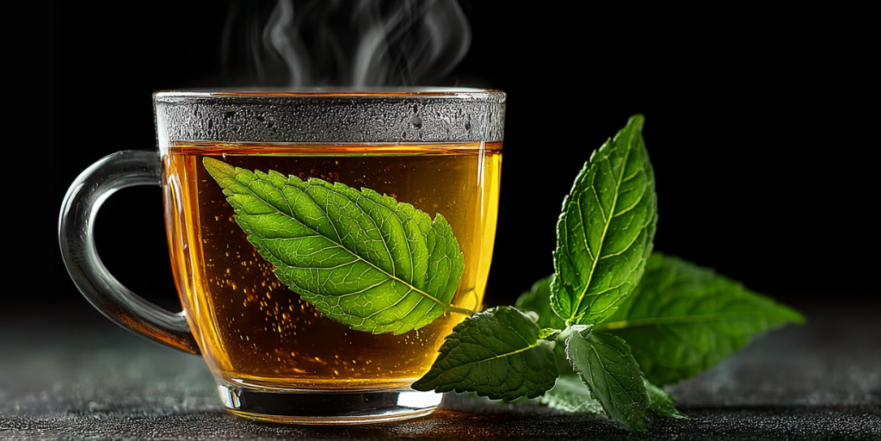➡️7. Clove: A Spicy Solution

The third helper against mucus is clove, a fragrant spice with power to clear congestion. What makes clove so good against mucus? Its secret is in something called eugenol, which makes up almost 85% of its essential oil. Eugenol acts like a strong natural antibiotic in your breathing passages. It directly attacks bacteria and viruses that might be causing that extra mucus in your throat. But clove’s anti-inflammatory power is what makes it truly special. Unlike other plants that work generally, clove has a special connection to the breathing passages. Its active parts go right to your bronchial tubes, pharynx, and larynx, reducing swelling in these tissues and, with that, the extra mucus production.
What’s not well-known about clove is that this small flower bud, from the Moluccas islands in Indonesia, was so valuable in ancient Rome that its price was higher than gold. Traders traveled for months on dangerous routes just to get a few pounds of this spice. And that value wasn’t by chance. Doctors back then had already noticed that people who used clove had fewer breathing problems, even during the sicknesses that hit Europe.
Now, to get its benefits against phlegm, you can make a strong tea. Put two cloves in a cup and pour in hot water. Cover the cup and let it sit for 10 minutes. This time allows all the active parts to get into the water. Another good way is to chew a clove directly. Its taste is strong, but you can leave it between your teeth and cheek for a few minutes. This releases the eugenol right into your throat, right where the mucus builds up. And a little-known trick is to mix clove with cinnamon. Both spices create a powerful team against mucus. A tea with one clove and half a teaspoon of cinnamon has been shown to be more effective than each herb alone.
➡️6. Ginger: The Mucus Breaker

Next, we have ginger, a root that breaks up mucus like no other plant. Its secret is in a special mix of things that work together to clear your breathing passages. Ginger has gingerols and shogaols, substances that directly attack how thick mucus is. They act like tiny scissors, cutting the long chains of proteins that make phlegm thick and sticky. The result is thinner mucus that your body can easily get rid of. What’s amazing about ginger is that it doesn’t just help get rid of mucus that’s already there; it also slows down its production from the start. Recent studies tell us that this root can reduce the making of mucin, the main protein in mucus, by up to 30%. It’s like partly turning off the faucet that’s causing the flood.
Think about Isabel, a 68-year-old woman with a long-lasting cough and phlegm, especially in the mornings. She starts drinking ginger tea every night before bed. The first week, she notices she can cough more easily, without that feeling of stuck mucus that bothered her so much. After a month, she might have mornings with less stuffiness and freer breathing. But there’s more. Ginger relaxes the muscles in your bronchial tubes. When these muscles are tight, your breathing passages get narrow. By relaxing them, you create a wider path for air to go in and out, taking that annoying mucus with it. Also, ginger’s ability to fight viruses is another good point. This root effectively fights the flu virus and RSV, two common causes of stuffiness and too much mucus.
For those who grew up in past decades, ginger isn’t a new trend but a return to old wisdom. Our grandparents already knew its benefits and used it in teas to clear chests during winters, long before science confirmed its properties. To get its benefits, you can make a tea. Slice a piece of fresh root the size of your thumb and boil it in 500 ml of water for 10 minutes. The heat pulls out all the active parts. Then let it sit, and it’s ready to drink. Now, for those who don’t like its spicy taste, powdered ginger is an option. Half a teaspoon dissolved in hot water, taken twice a day, gives similar results.
➡️5. Cinnamon: A Sweet Defender

Another strong helper against phlegm is cinnamon, that fragrant spice you probably have in your kitchen. What makes cinnamon so special for fighting too much mucus? Its power comes from cinnamaldehyde, something that acts like a real shield against tiny germs. Cinnamaldehyde isn’t just responsible for cinnamon’s unique smell; it’s also a tiny warrior that can slow down and even get rid of bacteria and viruses.
When you eat cinnamon, this stuff travels through your breathing system, getting rid of the germs that might be causing that extra phlegm. Cinnamon also has a direct effect on mucus that’s already formed, making it thinner and easier to get rid of. It’s like it sends a signal to your body saying, “This mucus isn’t needed anymore; it needs to go!” And your breathing system responds by moving that stuck mucus.
This effect is because of its expectorant properties. Cinnamon helps your breathing passages clean themselves naturally, increasing the movement of cilia, those tiny hairs that sweep mucus toward your throat to be removed. What few people know is that cinnamon has also been shown to work against the flu virus. This is one of the most common causes of stuffiness and too much mucus.
Now, something you should know: not all cinnamon is the same. Ceylon cinnamon, the real cinnamon, is the safest for medicine. Cassia cinnamon, more common in stores, has coumarin, something that can be harmful in large amounts. To tell them apart, look at the color and texture. Ceylon is lighter, and its bark is thinner and more fragile.
To get its benefits against phlegm, you can make a simple tea. Add a teaspoon of powdered Ceylon cinnamon or half a stick to a cup of hot water. Let it sit for 10 minutes. Another good way is to make a paste of cinnamon and olive or coconut oil. Mix two parts oil to one part powdered cinnamon. Take a teaspoon of this mix three times a day, letting it slowly melt in your mouth. This method lets the active parts work directly on your throat. Another trick is to add cinnamon to your morning tea or coffee. This habit not only makes it taste better but also helps prevent mucus buildup during the day.
➡️4. Garlic: The Natural Antibiotic

Next, we have garlic, a food with a special power to clean your throat. What makes it so good? It’s all about its main ingredient, allicin. But this stuff isn’t in whole garlic. It forms when you cut or crush it. Allicin acts like a real natural antibiotic in our breathing passages. It directly attacks bacteria and viruses that can cause that extra phlegm. But here’s a key detail: after cutting or crushing garlic, you need to let it sit for at least 10 minutes. This time allows the most allicin to form. A simple step that makes its protective effects much stronger.
And garlic’s benefits go beyond getting rid of mucus that’s already there. It also makes your defense system stronger from the inside, increasing the making of immune cells and making them better at fighting off outside invaders. Your body becomes a stronger fort, better ready for colds and flus. What surprises doctors? People who eat garlic regularly get over colds faster. In some studies, people who took garlic cut their sickness time from 5 days to just a day and a half. The simplest and strongest way to use garlic against phlegm is to eat it raw. You can crush a clove, let it sit for 10 minutes, and then mix it with a spoonful of oil.
But for those who can’t handle the strong taste of raw garlic, there are two other options. One is to add two crushed cloves to a cup of warm plant milk. Let it simmer on very low heat for 5 minutes, strain it, and add a pinch of turmeric. This drink, taken before bed, helps get rid of mucus while you sleep. The other option is garlic extracts in capsules, with a dose between 600 and 1000 mg a day. But look for supplements that say how much allicin they have, because that’s the part that really makes a difference.

